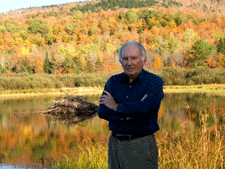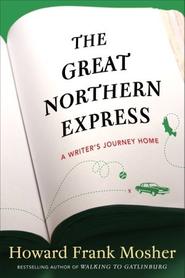 Howard Frank Mosher's new memoir, The Great Northern Express: A Writer's Journey Home (Crown, March 6, 2012), begins with bad news. The author walks to the post office and finds not a long-awaited MacArthur Fellowship, but a prostate cancer diagnosis. "I began to think this was kind of a wakeup call--not that you really need a wakeup call at age 65," he said. The prognosis was good, but the scare made him think about how he wanted to spend the time he might have left: "I thought, maybe I will spend some of it taking a tour across the country, coast-to-coast, border-to-border. I'll visit all the independent bookstores I can find, see some country, and"--since his 11th novel, Walking to Gatlinburg, was soon to hit stores--"at the same time, maybe this would be a way I could help my career." Long known as a regional writer focused on his fictionalized Northeast Kingdom, Mosher wondered whether a barnstorming 100-city book tour might move the needle.
Howard Frank Mosher's new memoir, The Great Northern Express: A Writer's Journey Home (Crown, March 6, 2012), begins with bad news. The author walks to the post office and finds not a long-awaited MacArthur Fellowship, but a prostate cancer diagnosis. "I began to think this was kind of a wakeup call--not that you really need a wakeup call at age 65," he said. The prognosis was good, but the scare made him think about how he wanted to spend the time he might have left: "I thought, maybe I will spend some of it taking a tour across the country, coast-to-coast, border-to-border. I'll visit all the independent bookstores I can find, see some country, and"--since his 11th novel, Walking to Gatlinburg, was soon to hit stores--"at the same time, maybe this would be a way I could help my career." Long known as a regional writer focused on his fictionalized Northeast Kingdom, Mosher wondered whether a barnstorming 100-city book tour might move the needle.
And so, the day after finishing his radiation treatments (which ended, by coincidence, on his 65th birthday) Mosher set out in a 1989 Chevy with 280,000 miles on it--dubbed the "loser cruiser" by his wife's students. Between an early standoff with a mother moose and mid-Saturday afternoon car troubles, the start was a bit rocky. But Mosher quickly hit his stride--and began to realize he might have a book on his hands. In time, he said, "I realized this was the right thing to do, and taking this kind of trip is almost always the right thing to do. It was a great fun adventure, and I decided when I got back I would write about it and intersperse chapters about our first year here in the Northeast Kingdom."
The road memoir is a time-honored tradition, but why weave in stories from that particular chapter of his life? Well, he'd already distilled several into a slideshow, which he often used on the tour. "I began to think it might be fun to try to show in whatever I wrote about the tour how I had become a writer, a somewhat regional writer focusing on life in this little fragment of an earlier New England," he explained, adding, "What we found here, and what led to my career and ultimately the insane 100-city book tour, was a goldmine of stories." It quickly becomes clear where Mosher found his literary material and how his early years in Vermont shaped him as a writer. These sections of The Great Northern Express are full of the anecdotes--and antics--of locals, especially Prof, the hard-charging, even harder-drinking superintendent who takes Mosher under his wing. "It was very fortuitous for me, as a country kid who was interested in hunting and fishing and old country storytellers, to find this little enclave of Robert Frost's New England," Mosher said.
 That's not to say Mosher has taken a straightforward, traditional approach to memoir writing. In fact, he's upfront about having written the book like he would have written one of his novels: "I did take some episodes from earlier and later book tours, and some of the characters are not untrue, but they're composites." (The outrageous Prof is an example--he's a combination of the first principal the Moshers worked for, as well as some other local characters.)
That's not to say Mosher has taken a straightforward, traditional approach to memoir writing. In fact, he's upfront about having written the book like he would have written one of his novels: "I did take some episodes from earlier and later book tours, and some of the characters are not untrue, but they're composites." (The outrageous Prof is an example--he's a combination of the first principal the Moshers worked for, as well as some other local characters.)
But perhaps his boldest choice was how he represents his time alone in the Loser Cruiser. Mosher has dramatized his cogitations by inventing a series of improbable companions, including his (deceased) Uncle Reg, neuroscientist Oliver Sacks and, most boldly, a West Texas incarnation of Jesus Christ. Mosher explained, "I needed to invent some way to illustrate some of the things I was thinking about when I was alone, everything from human mortality to politics. The admittedly outlandish method I chose was to invent imaginary characters with whom I could have conversations." But he admitted he also wrote these characters "for the sheer hell of it."
Mosher is comical and self-deprecating when discussing his motives behind both the journey and the memoir, but asked why one would leave home after such a sobering experience, he became serious. The book tour offered a great excuse to light out for the territories, but his reasons were more complicated: "As much as I love to write, I live to read. Every time I stepped into one of those wonderful independent bookstores and saw that array of books, some of which I had read and some of which I would go on to read, I felt a certain validation in my life as a reader and writer."
He added, "You know, I'd never seen the desert in flower. I'd never been to Holland, Michigan, when the tulips were blossoming. I'd never seen the Rocky Mountains in the spring." And that's what makes even the craziest journey worthwhile. --Kelly Faircloth, freelance writer

